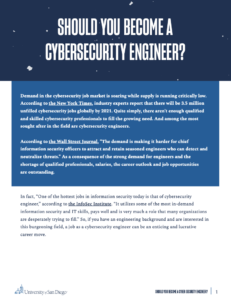Cybersecurity engineer sounds like an excellent job if you’ve got the right skills and education, partly because it is an in-demand career path with top employers paying six-figure salaries.
IT industry website CBT Nuggets cites a national average salary for cybersecurity engineers of $138,962. Leading employment websites list a wide range of salary figures depending on responsibilities, location, education, experience and other factors. For example, ZipRecruiter reports an average salary of $120,708 (range: $53,000–$185,000).
But this isn’t a field you can just jump into without the right qualifications. To get a job in the cybersecurity field, or specifically in cybersecurity engineering, you’re going to need the right skill set, some experience and education — ideally a cybersecurity engineering degree.
So what exactly do you need to get accepted into a master’s program and then subsequently find a high-quality job in the field? And how do you know if a career in cybersecurity engineering is right for you? Read on to find out!
First, we’ll delve into what strengths and skills, education and experience you’ll need to launch or advance a career in cybersecurity engineering. Then, we’ll answer the question “What does a cybersecurity engineer do?”
We’ll also introduce you to a University of San Diego alumnus who leveraged his Master of Science in Cybersecurity Engineering degree experience to move straight into a job at Salesforce. Finally, we’ll break down some of the similarities and differences between a cybersecurity engineering degree and cybersecurity operations and leadership degree.
Cybersecurity Engineering Careers | Education and Experience
Cybersecurity Engineering Careers | Strengths and Skills
Careers You Can Pursue with Cybersecurity Engineering Degree
What Does a Cybersecurity Engineer Do?
Cybersecurity Engineering in the Field | A USD Success Story
How to Choose a Cybersecurity Degree Program
Cybersecurity Engineering Degree vs. Cybersecurity Operations Degree
[RELATED] Cybersecurity Employment Growth Report [Stats, Salaries, Insights, Infographic] >>
Cybersecurity Engineering Careers | Education and Experience
To gain the qualifications necessary to land a job as a cybersecurity engineer, many choose to earn a master’s degree in the field. A master’s degree is beneficial to those looking to enter or advance in the field of cybersecurity because it offers a truly specialized approach. But to get accepted into a master’s program it is essential to have a background that has prepared you adequately. That means that you should have an undergraduate degree in engineering, computer science or a related field, and/or currently work in one of those areas.
It is important for cybersecurity engineers to have a technical background (including areas such as configuration and testing) and a deep breadth of knowledge around the different concepts and tools used to fight cybercrime. In order to troubleshoot current systems, identify and fix potential vulnerabilities, defend against hackers and cyberattacks, and design and innovate new security solutions, this knowledge and understanding is essential.

Cybersecurity Engineering Careers | Strengths and Skills
Calling cybersecurity engineer “one of the hottest jobs in information security today,” the Infosec Institute, explains that the exact skills required will depend on the organization and how they structure the role. In some organizations, “the cybersecurity engineer performs certain role-specific tasks only and some organizations have a more flexible approach where the role may dip into several different pools of responsibility.”
In the most general sense, successful cybersecurity engineers share the following traits and skills:
- A natural curiosity about the way things work
- A desire to break things down, get to the nuts and bolts of how things work
- Mathematical and science minded
- Detail oriented
- Methodical
- Collaborative
- Able to handle stress and fluid situations
Depending on the organization and role, sought-after hard skills for an IT security engineer may include:
- Secure coding practices, ethical hacking and threat modeling
- Proficiency in Python, C++, Java, Ruby, Node, Go and/or Power Shell
- IDS/IPS, penetration and vulnerability testing
- Firewall and intrusion detection/prevention protocols
- Windows, UNIX and Linux operating systems
- Virtualization technologies
- MySQL/MSSQL database platforms
- Identity and access management principles
- Application security and encryption technologies
- Secure network architectures
- Subnetting, DNS, encryption technologies and standards; VPNs, VLANs, VoIP and other network routing methods
- Experience with advanced persistent threats, phishing and social engineering, network access controllers (NAC), gateway anti-malware and enhanced authentication
Does this sound like you (or future you, after some additional training)? If so, cybersecurity engineering may be a great career opportunity. And your timing couldn’t be any better to enter the field, because the widespread and growing demand for qualified professionals has created a serious talent shortage and zero percent unemployment.
[RELATED] Download Your Free Guide to Becoming a Cybersecurity Engineer >>
Careers You Can Pursue with Cybersecurity Engineering Degree
Career opportunities for qualified cybersecurity engineers are prevalent across nearly all industries today, including finance, health care, insurance, education, entertainment, social media, defense, government and more. A recent search for “cybersecurity engineer” jobs on LinkedIn revealed thousands of listings at a variety of top companies across the nation, some of which are cited below:
- Visa
- Paypal
- FBI
- Amazon
- Ford Motor Corp.
- Home Depot
- Skechers
- McKinsey
- Liberty Mutual
- Norwegian Cruise Lines
- Boston Children’s Hospital
- Fidelity Investments
- University of New Hampshire
- Booz Allen Hamilton
Additionally, cybersecurity engineer is by no means the only role one can pursue with the right skills, education and experience. Similar and related positions include:
- Network Security Engineer
- Cybersecurity Architect
- Cybersecurity Consultant
- Chief Information Security Officer (CISO)
- Cybersecurity Consultant
[RELATED] Download Your Free Guide to Becoming a Cybersecurity Engineer >>
What Does a Cybersecurity Engineer Do?
Common job responsibilities for cybersecurity engineers include:
- Troubleshooting security and network problems
- Planning, implementing, managing, monitoring and upgrading security measures for the protection of the organization’s data, systems and networks
- Responding to all system and/or network security breaches
- Ensuring that the organization’s data and infrastructure are protected by enabling the appropriate security controls
- Participating in security-related change management processes
- Testing and identifying network and system vulnerabilities
- Performing assessments and penetration testing
- Developing and maintaining secure network solutions to protect against threats
- Daily administrative tasks, reporting and communication with the relevant departments in the organization
“Soft skills also play an essential role in this position since cybersecurity engineers are often asked to communicate their findings to executive leadership and may be asked to collaborate with a wide variety of stakeholders. The ability to communicate complex ideas quickly and clearly is critical to the success of this role,” according to industry blogger Philip Casesa, who ranks the job as one of the most in-demand cybersecurity positions.
[RELATED] Should You Become a Cyber Security Engineer? >>
Cybersecurity Engineering in the Field | A USD Success Story
What if you could graduate from a cybersecurity master’s degree program and walk straight into a dream job at one of the world’s top tech companies? Of course, there are no guarantees but that was the reality for University of San Diego alumnus Paul Cho, who earned his cybersecurity engineering master’s degree in May 2019 and started work as a security engineer at Salesforce that very same month.
With an interest in technology that dated back to his childhood, Cho worked a series of interesting tech jobs, then realized the huge career potential in the field of cybersecurity and decided to earn his master’s. He said the innovative online format offered at USD was well-suited to his need to continue working full time while earning his degree. “The program itself gives a very strong foundation” to build a career, said Cho, who spoke highly of the program’s rigorous academic approach and the mix of learning through video, audio, discussions with peers, written assignments, hands-on problem solving and more.
“The support structure with the school itself, with the professors, was excellent,” he said. “They were always available to answer questions and, more than that, their feedback on assignments was really invaluable. It made me aware of areas that I needed to work on.” He described one “eye-opening” assignment involving secure software design with classmates who included a chief information officer and a financial industry software architect. “I had to raise my game and I learned a lot from it.”
[RELATED] From USD to Salesforce: Meet Paul Cho, Security Engineer >>
How to Choose a Cybersecurity Degree Program
There are a number of different paths available if you feel that cybersecurity engineering or cybersecurity in general is a good fit and you meet some of the above criteria in terms of experience, education and skill strengths. If you aren’t yet ready to pursue a master’s degree there are numerous cybersecurity industry certifications that will help you gain expertise and demonstrate mastery in key areas.
Often, the best choice for those who know they want to work in cybersecurity engineering is to obtain a master’s degree in this discipline. An advanced degree in this field is highly sought after, often preferred or even required by prospective employers. By earning a degree in cybersecurity engineering you gain a comprehensive and focused education in a highly specialized field.
A high-quality degree program enables you to gain simulated experience in the types of work you will be doing on the job, connects you to a network of instructor-mentors with real-life experience in the field and, of course, provides a competitive edge in the employment market.
Cybersecurity Engineering Degree vs. Cybersecurity Operations Degree
If you are comparing cybersecurity master’s programs, be sure to evaluate the strength of the curriculum, the structure and reputation of the program, the faculty makeup and how well the program format and scheduling lends itself to the needs of working professionals. Beware of computer science master’s degree programs with a specialization in cybersecurity. Unless you want a broad computer science degree, this option typically only gives you a few classes in cybersecurity and is not nearly as focused as a master’s degree in cybersecurity.
There are at least two distinct categories when it comes to cybersecurity master’s degrees: Cybersecurity Engineering vs. Cybersecurity Operations and Leadership. The former track tends to be more focused on the engineering aspects of software and hardware security, while the latter emphasizes gaining a deep understanding of cybersecurity concepts, topics and theories, along with leadership skills. Both options provide an intensive, in-depth focus on the most critical issues and threats being confronted by cybersecurity professionals today.
MS in Cybersecurity Engineering
According to the Infosec Institute, “Organizations are increasingly looking for candidates with a master’s degree in a related field, especially when it comes to senior cybersecurity engineering roles. Look for organizations requiring master’s degrees to become more commonplace for this role in the future.”
If you are exploring your options for a cybersecurity engineering master’s degree options, one program that you are likely to discover in your research is the Master of Science in Cybersecurity Engineering offered online as well as on campus by the University of San Diego. Developed in collaboration with business, military, intelligence community and government stakeholders to deliver in-demand knowledge and skill sets, the USD program features dynamic, highly relevant curriculum designed by instructors with years of applied experience protecting national assets from the worst types of cyber threats.
MS in Cybersecurity Operations and Leadership
The University of San Diego also offers a 100% online Master of Science in Cybersecurity Operations and Leadership; in fact, the program recently earned a place on the Best Value Schools List of Best 16 Masters in Security in 2021. A key differentiator that makes the USD program unique in the nation is its emphasis on leadership and on understanding the “big picture,” as it helps graduate students develop the ability to effectively communicate mission-critical cybersecurity needs and priorities to key stakeholders throughout their organization.
For additional cybersecurity career information, master’s degree student success stories, industry insights and more, check out the University of San Diego Cybersecurity Blog.





